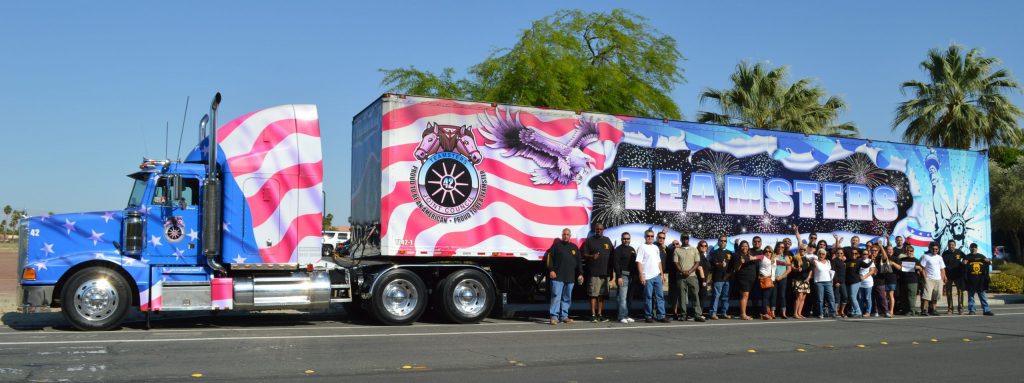Editor’s note: The International Trade Commission is holding hearings on the US Mexico Canada Agreement (USMCA). Mike Dolan gave the following testimony for the International Brotherhood of Teamsters. Dolan is also on the CPA board.
On behalf of 1.4 Million Teamsters, we are grateful to the Commission for the opportunity to describe our hopes and concerns about the replacement for the North American Free Trade Agreement (NAFTA) and its likely effect, if ratified, on the U.S. economy.
Few organizations have a greater stake in U.S. trade policy than the International Brotherhood of Teamsters. As a transportation union, our members on the roads and rails, in warehouses and ports coast to coast, depend on exports for their livelihoods. As a dairy workers’ union, Teamsters in milk production and processing, throughout the supply chain, prepare Grade A products for foreign markets. Our members who work in food processing, bakeries and breweries, want to compete globally. Teamsters who work on movie sets know the importance of growing foreign markets for the American motion picture industry. Teamsters are pro-trade; but we want fair trade.
We opposed the original NAFTA because we predicted that its implementation would result in a migration of manufacturing jobs to Mexican factories thereby causing harm to the economic health of particular industries and communities and to the U.S. economy as a whole. That prediction and our opposition have been validated by specific job loss numbers that are well documented, through two decades of filings under the NAFTA Trade Adjustment Assistance (TAA) program and including the service sector jobs that depend on a sustainable and vibrant manufacturing base. We respectfully direct the Commission’s attention to the analysis of the Economic Policy Institute that describes the trade rules and trade deficits that resulted in the loss of nearly 700,000 jobs in the first twenty years after NAFTA’s entry-into-force.
We share the Administration’s trade agenda insofar as the renegotiation of the NAFTA creates an opportunity to replace the flawed and failed corporate “free trade” model with a new approach that will benefit working families throughout North America. We commend the United States Trade Representative (USTR) on the inclusion of several innovations in the text of the new NAFTA that will inure to the betterment of American workers, including Teamster members, if the implementing legislation and any Statement of Administrative Action (SAA) support those innovations with effective enforcement mechanisms, compliance safeguards and resources, especially as to the new Labor Chapter that replaces the ineffective side letter to the original NAFTA.
Specifically, the new NAFTA requires Mexico to reform its labor laws to ensure workers’ rights to secret ballots in union elections, which will strengthen collective bargaining which, in tum, will create necessary (but not sufficient) conditions for higher wages. Further, two important innovations among the automobile rules of origin – namely, the increase in the regional value content from 62.5 to 75% and the new labor value content rule (45% of autos must be produced by workers making an average of $16 per hour) — will benefit North American workers in vehicle production by putting upward pressure on wage rates. Finally, the new NAFTA Investment Chapter significantly diminishes the rights of corporate investors to sue governments for policies that might reduce future profits and, therefore, undermines the attendant incentive for transnational corporations to offshore good American jobs.
Three additional deviations from the original NAFTA template (that was mimicked in subsequent sub-optimal multilateral deals like the CAFTA and the TPP) augur well for the economy and for a new model that rebalances the benefits and burdens of America’s trade relations and should inform the analysis of the Commission. First, we note with approval the overdue debut of a chapter on cun:ency manipulation, which we and many members of Congress urged in vain throughout the negotiation of the TPP. As the Commission is doubtless well aware, the benefits of tariff reductions are meaningless in an agreement that fails to halt currency misalignment by all the signatory states. Second, we appreciate the creative solution to a failing of the original NAFTA that undermined highway safety and the competitiveness of the American trucking industry; and we intend to work with Congress and the Department of Transportation to give full effect to the non-conforming measure (NCM) in Annex II to the cross-border services chapter. Third, another new provision will require that the Paiiies regularly review the real-life effects of the new NAFTA, with the explicit option to withdraw if it is not meeting our expectations as to better jobs and higher wages, lower trade deficits and the other negotiating objectives under the 2015 Fast Track bill.
This Commission will have an important role in that last feature of the renegotiated NAFTA – the review or “sunset” provision — in analyzing the actual effects of the new agreement on working families and the economy as a whole. We respectfully submit that the new model that is emerging from renegotiation of the old NAFT A template demands a new model for your analysis. Accordingly, we repeat the recommendation we urged in our testimony relating to the likely economic effects of the TPP:
We observe that two competing models have been recommended to you, each of which predicts fewer jobs in the manufacturing sector due to the TPP for the ten-year period following entry into force of the pact in all twelve countries. The first is the flawed “comparable general equilibrium” (CGE) model that assumes full employment and constant income distribution between workers and the corporate and investment elites – that is, no increase in income inequality … The other model is the United Nations Global Policy Model (GPM), which we urge you to utilize in this Investigation because it allows for changes in employment and inequality and their effect on demand and growth and is, therefore, more realistic.
The Commission will recall that the Teamsters opposed the TPP, once we enjoyed the opportunity to review the full and final proposed agreement. For the reasons set forth above, we conclude that the new NAFTA is a better deal for American workers and our members than the original NAFT A. However, we must withhold our support until the Commission has published its analysis pursuant to Fast Track and until the administration presents the 116th Congress with implementing legislation that fulfills the promise of the progress made at the negotiating table on our priority issues, especially the protection of workers’ rights under the Labor Chapter. With this pre-hearing statement, we reserve the opportunity to expand on these points in our testimony and in subsequent written filings with the Commission. In the meantime, on behalf of the Teamsters, we thank the Commission for undertaking this Investigation and this important inquiry about the likely real-life effects ofNAFTA’s replacement on American working families.













